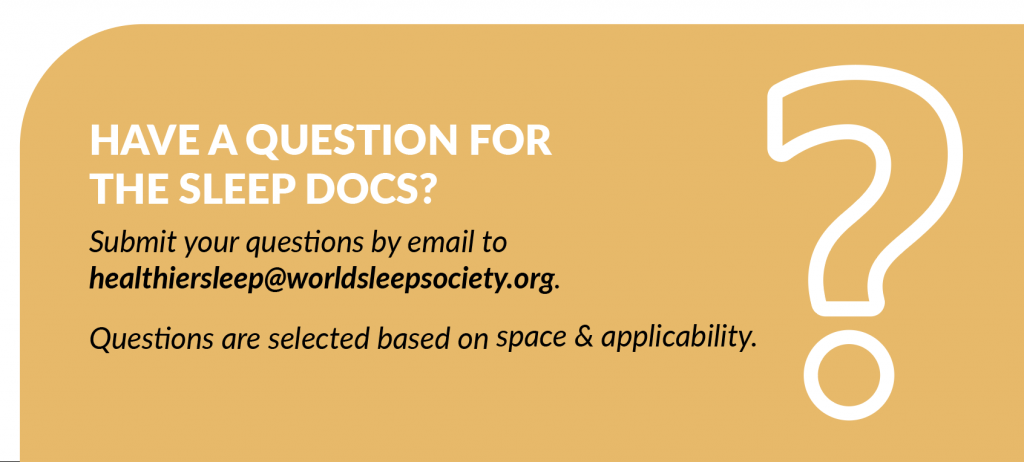As answered by our Special Issue Reviewers

Q: What are some warning signs of sleep deprivation?
__________________________________________________________________________________
Dr. Thomas:
Waking up tired, needing more than two cups of coffee, feeling tired, yawning, having difficulty focusing during the middle of the afternoon and needing to nap are reasonable red flags.
Dr. Lipford:
Most adults need 7-9 hours of good quality sleep each night. If you regularly obtain less than 7 hours of sleep or if your sleep quality is poor, you may be sleep-deprived. This can lead to many different symptoms including: daytime sleepiness or fatigue, trouble with concentration and multi-tasking, memory problems, mood issues or irritability.
Beyond these symptoms, there are many harmful health effects that can be associated with chronic sleep deprivation—including high blood pressure, weakened immunity and weight gain.
People who are sleep deprived are also at an increased risk for automobile accidents. It is vital that we all get adequate, good quality sleep on a regular basis. If you struggle with sleep or experience symptoms suggesting sleep deprivation, reach out to your doctor for advice.
Dr. DelRosso:
The first and most common sign is excessive sleepiness during the day. You may also think you feel tired but not necessarily sleepy. Some people may feel irritable, moody and unable to concentrate. Studies have shown that we cannot always properly estimate the severity of our sleepiness and in fact may actually underestimate it, so the risk of accidents increases when we are sleep deprived.
Dr. Zak:
You are likely asking about insufficient quantity of sleep, but one can argue that sleep deprivation can be divided into two parts: insufficient quantity or quality of sleep (or both). In general, people who have insufficient quantity of sleep can awaken refreshed after a short sleep time, but then get drowsy later in the day—perhaps dozing off while at the computer or while viewing entertainment, generally with sedentary or more passive activities.
Insufficient quantity of sleep can also be manifest by the desire to take a nap, and siesta cultures were designed to have a shorter nocturnal sleep period with a scheduled daytime nap that would provide the additional sleep time, or by spontaneously sleeping longer on weekends. Of note, people can really push themselves and not always be aware that they have gone past their limits. In fact, many car accidents from insufficient quantity of sleep occur close to home as the eyelids drop oh so briefly, but just long enough.
Signs of insufficient quality of sleep include never feeling refreshed regardless of the quantity of sleep and should prompt clinical investigation by a healthcare provider to look for potential causes.
Q: I wake up at 5:00 am for work so I sleep in on the weekends. Is this bad for me?
_____________________________________________________________________________________________________________________________
Dr. DelRosso:
There are benefits to regular sleep, yes. But in this case, we recommend trying to keep a sleep schedule that will allow you to sleep at least 7 hours nightly. In this case, I would recommend establishing a bedtime routine that will allow you to be asleep by 10 pm at the latest to wake up at 5 am to be able to feel refreshed and restored during the day.
Dr. Thomas:
This is “social jet lag” with or without chronic partial sleep deprivation. Some catch up—say two hours—which clears out the sleep debt is probably okay, but a 5am wake time is best compensated by an earlier bedtime. Long-term social jet lag has been associated with weight gain, pre-diabetes and depression, so it’s worth keeping an eye on.
Q: I nap every day. Is this okay or does it mean I’m not sleeping well?
_____________________________________________________________________________________________________________________________
Dr. Thomas:
If a nap is needed every day, that is abnormal and reflects excessive sleep drive. This may be from inadequate sleep at night, poor quality sleep, or a disorder of daytime alertness such as narcolepsy. Formal evaluation is recommended.
Dr. DelRosso:
This depends on how old you are and where do you live. Napping or siesta can be culturally acceptable in some parts of the world. Plus, power naps can be restoring and refreshing. Usually, children stop napping by ages 3-4, and in the United States, we usually do not nap and therefore consider a return to napping a sign of insufficient sleep or daytime sleepiness secondary to another cause.
It is important to differentiate a planned nap time from dozing off watching TV or after lunch. If dozing off occurs, you may be having insufficient sleep or a sleep disorder that is contributing to daytime sleepiness.
Dr. Zak:
Daily napping is fine and likely reflects a divided total sleep schedule with a shorter period of sleep at night (and shorter is relative, for a long sleeper, a 7-hour sleep period can be insufficient and necessitate a daily nap) and is the practice in some cultures (although fewer these days). In fact, our biology would encourage that since it is normal to have an opening of the so-called “sleep gate” in the afternoon at siesta time in addition to night time.
It is a problem if you are unable to maintain alertness when you need to, such as during conversation, work or driving. In addition, frequent daytime napping could indicate an underlying disorder of alertness, such as narcolepsy or medication-induced hypersomnia, and should be evaluated by a clinician.
Q: My grandson is still going into his parents’ bed to sleep part of each night and he’s 6. Isn’t this bad for everyone’s sleep?
_____________________________________________________________________________________________________________________________
Dr. Thomas:
There are strong social and intra-family norms which determine if a child sleeping in the bed with parents is considered a problem or not. If the child has his/her own room and initiates sleep without fuss, then this could be a reaction to nightmares, fears of being alone after a normal brief awakening or disrupted nighttime sleep, as examples.
This “arrangement” may work well enough that no one’s sleep is disturbed, but can also become a point of conflict, when everyone’s sleep is interrupted. If problematic, consulting with a healthcare provider with expertise in childhood behavioral sleep approaches should provide a solution.
Dr. DelRosso:
Usually, this kind of behavior in children represents “sleep association insomnia” and is the result of the child not being able to fall asleep independently. When the parents stay in the room until the child falls asleep and then leave the room, the child usually wakes up in the middle of the night seeking parental presence.
We can help in this situation by slowly removing the parent from the bedtime routine to allow the child to fall asleep independently. Other causes that can contribute to this behavior include anxiety and/or a sleep disorder waking the child up in the middle of the night.




